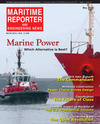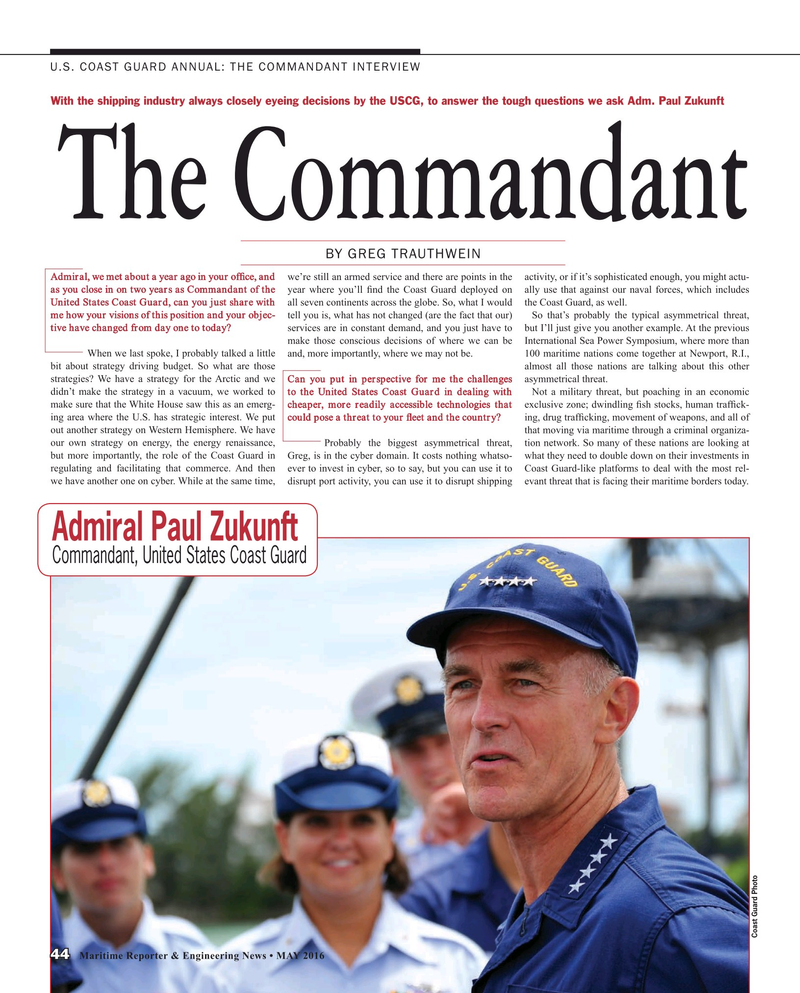
Page 44: of Maritime Reporter Magazine (May 2016)
The Marine Propulsion Edition
Read this page in Pdf, Flash or Html5 edition of May 2016 Maritime Reporter Magazine
U.S. COAST GUARD ANNUAL: THE COMMANDANT INTERVIEW
With the shipping industry always closely eyeing decisions by the USCG, to answer the tough questions we ask Adm. Paul Zukunft
The Commandant
BY GREG TRAUTHWEIN
Admiral, we met about a year ago in your of? ce, and we’re still an armed service and there are points in the activity, or if it’s sophisticated enough, you might actu- as you close in on two years as Commandant of the year where you’ll ? nd the Coast Guard deployed on ally use that against our naval forces, which includes
United States Coast Guard, can you just share with all seven continents across the globe. So, what I would the Coast Guard, as well. me how your visions of this position and your objec- tell you is, what has not changed (are the fact that our) So that’s probably the typical asymmetrical threat, tive have changed from day one to today? services are in constant demand, and you just have to but I’ll just give you another example. At the previous make those conscious decisions of where we can be International Sea Power Symposium, where more than When we last spoke, I probably talked a little and, more importantly, where we may not be. 100 maritime nations come together at Newport, R.I., bit about strategy driving budget. So what are those almost all those nations are talking about this other strategies? We have a strategy for the Arctic and we Can you put in perspective for me the challenges asymmetrical threat. didn’t make the strategy in a vacuum, we worked to to the United States Coast Guard in dealing with Not a military threat, but poaching in an economic make sure that the White House saw this as an emerg- cheaper, more readily accessible technologies that exclusive zone; dwindling ? sh stocks, human traf? ck- ing area where the U.S. has strategic interest. We put could pose a threat to your ? eet and the country? ing, drug traf? cking, movement of weapons, and all of out another strategy on Western Hemisphere. We have that moving via maritime through a criminal organiza- our own strategy on energy, the energy renaissance, Probably the biggest asymmetrical threat, tion network. So many of these nations are looking at but more importantly, the role of the Coast Guard in Greg, is in the cyber domain. It costs nothing whatso- what they need to double down on their investments in regulating and facilitating that commerce. And then ever to invest in cyber, so to say, but you can use it to Coast Guard-like platforms to deal with the most rel- we have another one on cyber. While at the same time, disrupt port activity, you can use it to disrupt shipping evant threat that is facing their maritime borders today.
Admiral Paul Zukunft
Commandant, United States Coast Guard
Coast Guard Photo 44 Maritime Reporter & Engineering News • MAY 2016
MR #5 (42-49).indd 44 5/2/2016 10:30:19 AM

 43
43

 45
45
